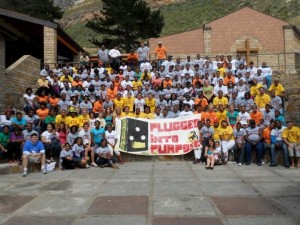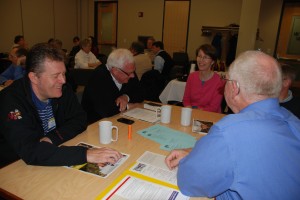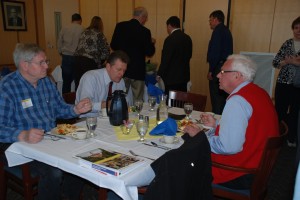
Afternoon seminars at the Africa Jam retreat.
A New Staff and Volunteer Training Resource for Congregations
Rev. Grady St. Dennis
As I learn more about Robert Greenleaf’s writing on the concept of Servant Leadership, I cannot help but to come back repeatedly to the exchange Jesus had with his disciples in Luke 22: 24-27. “A dispute also arose among them as to which of them was considered to be greatest. Jesus said to them, “The kings of the Gentiles lord it over them; and those who exercise authority over them call themselves Benefactors. However, you are not to be like that. Instead, the greatest among you should be like the youngest, and the one who rules like the one who serves. For who is greater, the one who is at the table or the one who serves? Is it not the one who is at the table? But I am among you as one who serves.”
When Jesus’ followers begin to wrestle with each other about their concerns for power and position Jesus responds by noting the position he himself has assumed and opens—for his followers then and today—a different mindset regarding the purpose of power and the responsibility of position. In short, we are given a glimpse of what actual greatness is about.
I find the work that Larry Spears and others have done to identify within Greenleaf’s writing the basic characteristics of the servant-leader not only helpful for better understanding the depth of servant leadership, but to me the characteristics themselves also offer a practical starting point for approaching the task of developing servant-leaders.
An important part of the outreach of the Gustavus Center for Servant Leadership occurs through the programs and events Gustavus shares with the more than 530 member congregations of the Gustavus Association of Congregations. Therefore, designing a series of educational training sessions around the basic characteristics of the servant-leader for the context of the Christian congregation came together quite naturally. The Cultivating Servant-Leaders Series offers a practical resource for the congregations to introduce the concept of Servant Leadership and reflect upon the basic skill sets of the servant leader.
The Cultivating Servant-Leaders Series consists of three workshops: Skills that are at the Heart of the Great Leaders, Skills that Multiply Efforts and Lead to True Greatness, and Skills Great Leaders have but Seldom Talk About. The word “great” in the title of each session is by design to tie us back to that different mindset Jesus had regarding “greatness” and the purpose of power and the responsibility of position.
The workshop “Skills that are at the Heart of the Great Leaders” begins with two reflection questions: Have you ever been in the presence of a truly great leader? What was it about them that made them a great leader from your perspective? Stepping back to consider what has been our lived experience with respect to our leaders helps us connect with our own experiences and helps us name the specific qualities that were valued. During this workshop, we focus particularly upon the characteristics of Listening, Empathy, Awareness and Healing and why such abilities might be at the heart of a servant-leader.
A stewardship question begins the reflection time in the workshop “Skills that Multiply Efforts and Lead to True Greatness.” How can we make the best use of the time and resources that have been given? During this workshop, we reflect on the relationship between Stewardship, People Growth and Community Building and how these broader purposes are embraced by the servant-leader.
The final workshop in the series “Skills Great Leaders have but Seldom Talk About” seeks to highlight those characteristics of the servant-leader that may not be as immediately or easily recognized, though are critical aspects of the servant-leader. The sort of things the servant-leader simply does but does not really talk much about, other than privately, for mentoring the personal growth of another. Two questions help us get at these: By definition a “leader” is one who has others following them—what is it about this person that makes one want to take their lead? What sort of person do smart people look to for direction? During this workshop we reflect upon how the skill of Persuasion relates to authority and personal power; how one’s ability to Conceptualize can both help frame the difficult concepts for better group understanding as well to challenge and stretch group thinking; and finally, we consider what the “lead” in leader is all about as we discuss the wisdom of quality time spent in thinking things through and the gift of Foresight.
The early demand for the Cultivating Servant-Leaders Series and the variety of different ministry settings we have offered the series in has provided an excellent range of feedback and confirmed our sense of the series usefulness as a resource for developing servant-leaders. To give a sense of the variety of different ministry settings and the type of insights that were gained from the experience I will conclude by sharing three brief examples of how the resource was used this past year.
The ministries of Lord of Life Lutheran Church in Maple Grove, Minnesota, a very large ELCA congregation, are served by a mixture of paid staff and volunteers. In congregations that are very large and involved in a wide range of ministry offerings there is a complex web of staff, volunteer and community relationships that come together to inform the ministry endeavors. Many congregations organize themselves around departments or teams to serve each ministry. The prayer ministry team of Lord of Life Lutheran is an example of one such team. During the Fall 2011, this team of about 10 individuals spent two days retreating at Gustavus with the Cultivating Servant-Leaders Series as the content of the retreat. The series proved to be a useful resource for helping them both dig deeper into their purpose as a team as well as the role the team serves for the wider ministry offering of the congregation.

St. Dennis (lower left in blue) participating in the Africa Jam youth retreat in Simon’s Town, South Africa.
Africa Jam is a Christian ministry in Cape Town, South Africa that offers after school programming in twenty-two high schools, summer bible camps and leadership workshops for inner city youth from four of the poorest urban townships in Cape Town. In January 2012, a group of Gustavus staff, students and alumni joined the Africa Jam staff and approximately two hundred South African youth for a week-long bible camp experience at the Rocklands Retreat Centre in Simon’s Town, South Africa. Thirty Africa Jam staff and volunteers along with twenty travelers from Gustavus participated in the Cultivating Servant-Leaders Series as a part of the pre-camp staff training and a daily leadership seminar experience during camp. The cross-cultural context added an important dimension to the conversation, revealing at the same time both the universal nature of the characteristics of the servant leader as well as real cultural differences in how we experience community, dynamics of power and the role of the leader.
The Gustavus Center for Servant Leadership offers a clergy renewal peer ministry program called Pastor-to-Pastor. This program is offered in partnership with the Southwestern and Southeastern Minnesota Synods of the Evangelical Lutheran Church in America and consists of monthly peer led accountability small groups and three overnight retreats at Gustavus during each year. In February 2012, the Cultivating Servant Leadership Series was the content for the Pastor-to-Pastor clergy retreat at Gustavus at which more than thirty-five Lutheran pastors participated. The role of the pastor in the life of a faith community is complex and can be demanding. It was evident that many of the retreat participants found the concept of Servant Leadership reaffirming for them in their calling. Reflecting upon the characteristics of the servant-leader helped those retreating examine their own leadership style and the strengths and growth areas each had as servant-leaders. The great potential of this resource for training of congregation staff and volunteers was particularly noted.
For more information on arranging the Cultivating Servant-Leaders Series for your ministry context please contact Marilyn Beyer in the Gustavus Center for Servant Leadership at 507-933-7001 or mbeyer@gustavus.edu.
About the Author
PASTOR GRADY ST. DENNIS serves as Director for Church Relations and Community Engagement and Associate Director of the Center for Servant Leadership. An ordained minister of the Evangelical Lutheran Church in America, St. Dennis is a part of the campus ministry team serving as College Chaplain. In addition to his ministry at Gustavus, St. Dennis has served as the House Chaplain for the Minnesota House of Representatives 87th Legislative Session.


